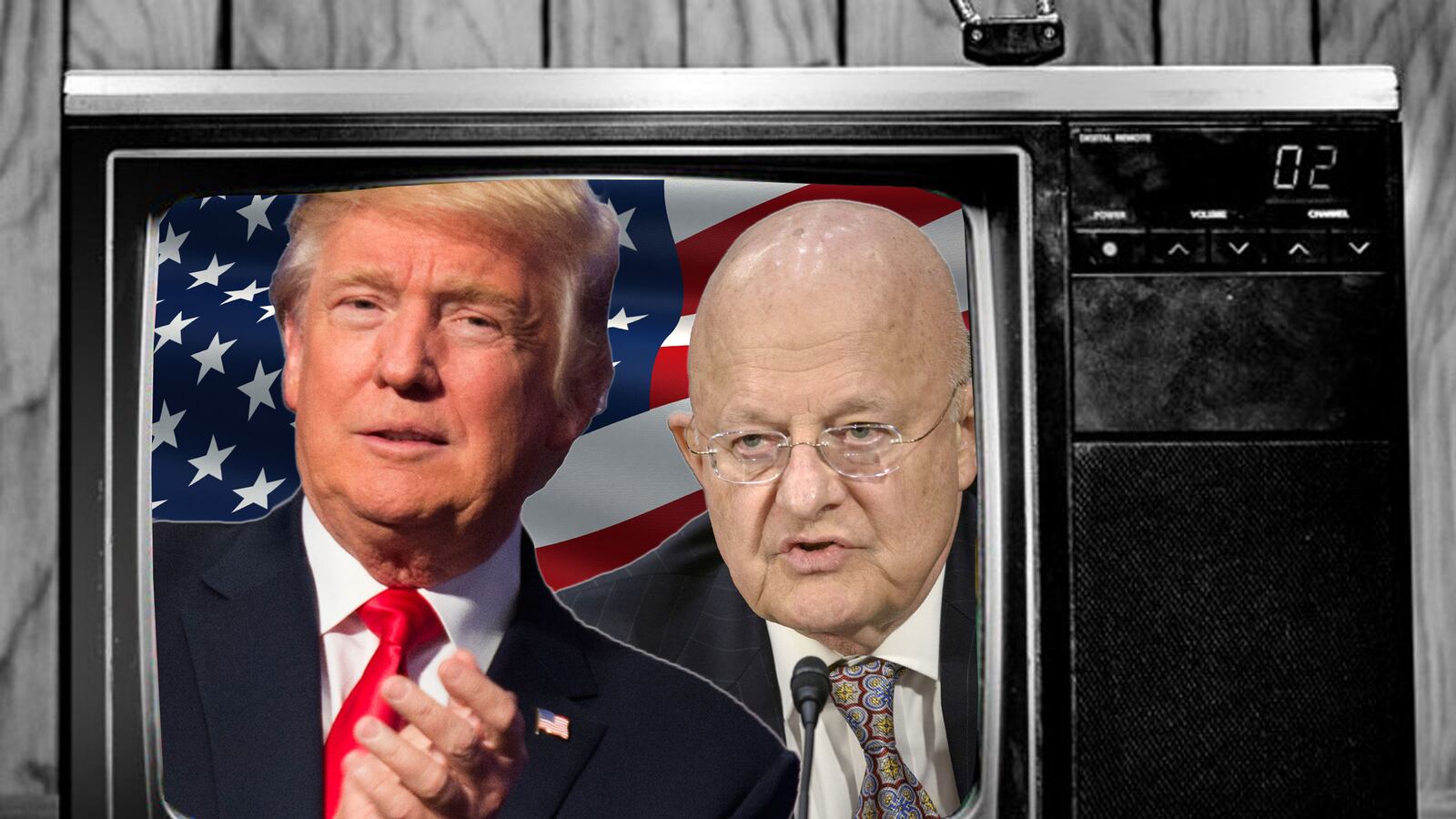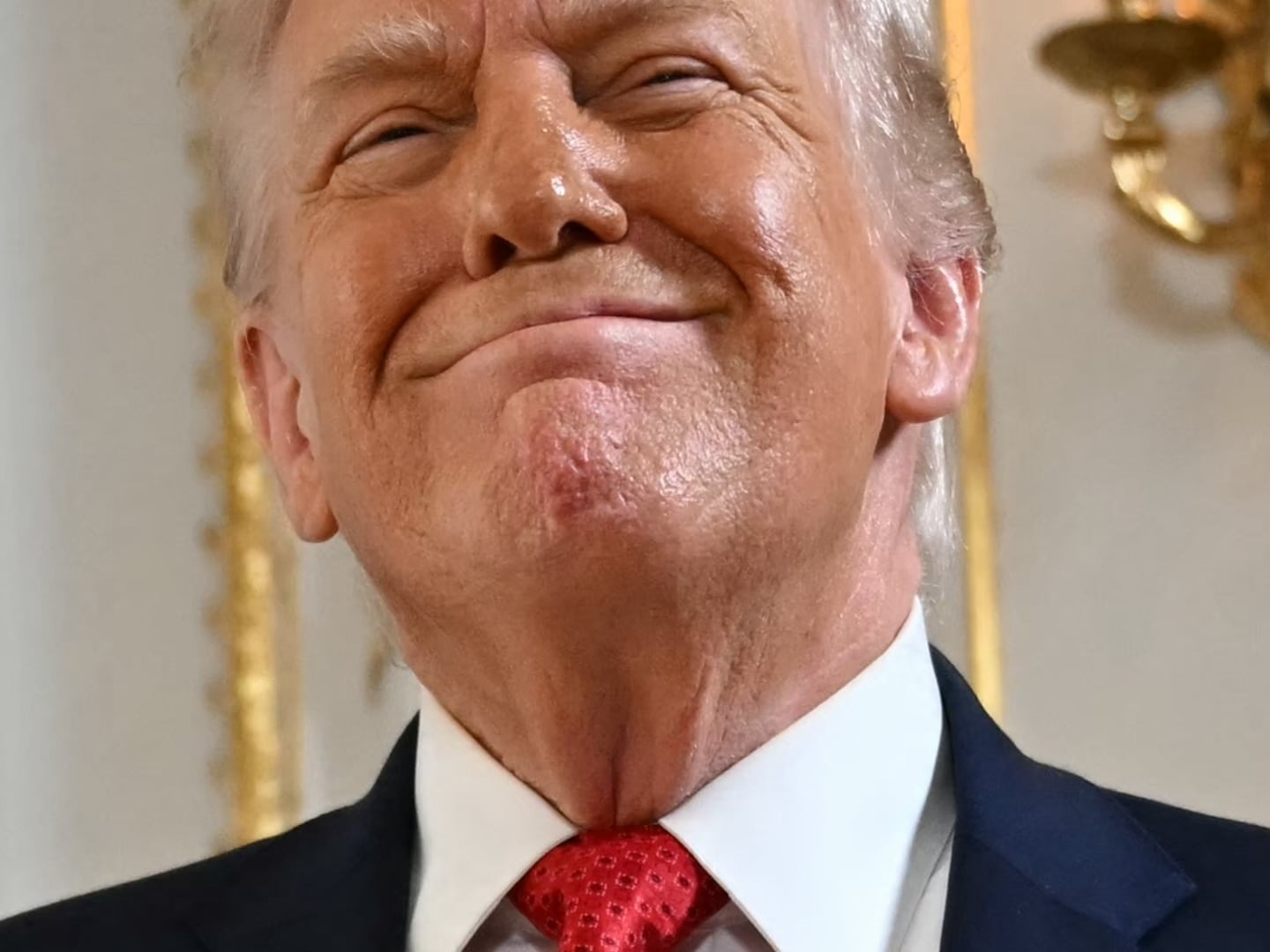By Louis Jacobson and Linda Qiu
President-elect Donald Trump has suggested the U.S. intelligence community found no evidence of foreign influence on the 2016 election, but that’s a misleading description of what the evidence shows.
Trump was briefed Friday on the probe into allegations of Russian influence, including possible connections to electronic hacking and public releases of private communications by senior Democrats.
A declassified version of the report found that “Russian President Vladimir Putin ordered an influence campaign in 2016 aimed at the U.S. presidential election. Russia’s goals were to undermine public faith in the U.S. democratic process, denigrate (Trump’s opponent, Hillary) Clinton, and harm her electability and potential presidency.”
Following the intelligence briefing, Trump’s office released a statement. After noting the “constructive meeting” and the “tremendous respect” he had for the intelligence community’s work, Trump said:
“While Russia, China, other countries, outside groups and people are consistently trying to break through the cyber infrastructure of our governmental institutions, businesses and organizations including the Democrat (sic) National Committee, there was absolutely no effect on the outcome of the election including the fact that there was no tampering whatsoever with voting machines. There were attempts to hack the Republican National Committee, but the RNC had strong hacking defenses and the hackers were unsuccessful.”
The phrase that caught our eye was “there was absolutely no effect on the outcome of the election.”
That’s a pretty definitive statement. And Trump echoed that argument in a Jan. 7 tweet: “Intelligence stated very strongly there was absolutely no evidence that hacking affected the election results. Voting machines not touched!”
The argument that there was no impact of any kind on the election outcome is not backed up by the intelligence community’s report. The report specifically stated it didn’t look at that question. Trump’s statement rates Mostly False.
Here’s what the report actually said:
“We did not make an assessment of the impact that Russian activities had on the outcome of the 2016 election. The U.S. Intelligence Community is charged with monitoring and assessing the intentions, capabilities, and actions of foreign actors; it does not analyze U.S. political processes or U.S. public opinion.”
So if the Trump campaign is using the intelligence community’s report to back up its assertion that there was no Russian influence on the outcome, it’s doing so without justification.
When we contacted the Trump transition media office, we did not receive a response. Here’s our review of the publicly available evidence.
Ballot counts
The Trump camp has a point on one issue: Despite some concern among security experts going into the election that Russia might hack into state and local vote-counting systems and tamper with the tallies, the intelligence community’s report found that any such efforts by Russia were not successful in changing any votes.
The report says that while “Russian intelligence obtained and maintained access to elements of multiple U.S. state or local electoral boards,” the Department of Homeland Security “assesses that the types of systems Russian actors targeted or compromised were not involved in vote tallying.”
Rep. Adam Schiff (D-CA), the ranking Democrat on the House Intelligence Committee, conceded that point in an interview with the PBS NewsHour on Jan. 6.
“It is true there is no evidence that the tampering with voter machines or tampering with voter registrations or any of like that affected the counting of the votes. That’s true,” Schiff told PBS’s Judy Woodruff.
Some observers might be concerned that Russia did manage to breach at least some election authorities’ computer networks, and they might also be concerned that Russia and Putin, according to the report, tried to influence the election, even if it’s less clear whether they succeeded.
Still, Trump has a point that Russia didn’t change votes electronically.
Ballot tampering vs. other types of Russian influence
Members of the Trump camp have portrayed the report’s clean bill of health on the question of Russian ballot-tampering as proof that Russia had no impact at all on the election.
For instance, on the Jan. 8 edition of CNN’s State of the Union, incoming White House counselor Kellyanne Conway told Jake Tapper that “if you read the full report, they make very clear, [Director of National Intelligence James] Clapper in his testimony [to the Senate Armed Services Committee] made very clear on Thursday under oath that that any attempt, any aspiration to influence our elections failed. They were not successful in doing that.”
On Fox News Sunday, incoming White House Chief of Staff Reince Priebus echoed Conway’s invocation of Clapper’s testimony, saying Clapper had testified to the Senate panel “that there is no evidence in the report that any of this changed the outcome of the election.”
Neither assertion is accurate.
First, a lack of ballot tampering does not equal a lack of Russian influence on the election.
Conway and Priebus essentially defined ballot-rigging as the only way an election can be influenced, when in reality the intelligence report primarily addresses other ways Russia tried to influence the election. The Russian effort blended, in the report’s words, “covert intelligence operations—such as cyber activity—with overt efforts by Russian Government agencies, state-funded media, third-party intermediaries, and paid social media users or ‘trolls.’”
And second, Clapper in his testimony never said that “any attempt, any aspiration to influence our elections failed” (as Conway put it) or that “there is no evidence in the report that any of this changed the outcome of the election” (as Priebus put it).
Clapper’s most direct remark at the Senate hearing on this issue came in this exchange with the panel’s chairman, Sen. John McCain (R-AZ):
McCain: “So really, what we’re talking about, is if they succeeded in changing the results of an election, of which none of us believe they were, that would have to constitute an attack on the United States of America because of the effects, if they had succeeded, would you agree with that?”
Clapper: “First, we cannot say—they did not change any vote tallies or—or anything of that sort.”
McCain: “Yeah, I’m just talking about…”
Clapper: “And we have no—we have no way of gauging the impact that—certainly the intelligence community can’t gauge the impact it had on the choices the electorate made. There’s no way for us to gauge that.”
Subsequently in the hearing, Clapper arguably went even further in a response to questioning by Sen. Angus King (I-ME).
King, referring to his work with Baltic states that have been grappling with Russian influence in elections for several years, said, “The best defense is for our public to know what’s going on, so they can take it with a grain of salt… That’s why I think public hearings like this and the public discussion of this issue is so important, because we’re not going to be able to prevent this altogether. But we need to have our people understand that when they’re being manipulated. Would you agree with that conclusion?”
Clapper responded, “Absolutely. That’s why I feel so strongly about the statement in October,” referencing his own statement during the campaign that the Russian government had been engaged in efforts “intended to interfere with the U.S. election process.”
How credible is the argument that Russia influenced the election in some fashion?
Schiff is one of many Democratic officials who believe that other types of Russian efforts may have had an impact on an election that ultimately hinged on fewer than 100,000 votes cumulatively in three states—Michigan, Pennsylvania, and Wisconsin.
In his PBS interview, Schiff specifically referred to the hacking and release to websites such as WikiLeaks of personal emails written and received by Clinton campaign chairman John Podesta and other top Democrats—releases that Trump prominently featured during the campaign.
“The daily dumping of information that was damaging to Secretary Clinton and helpful to Donald Trump was hugely consequential,” Schiff said.
But is it possible to move beyond a gut feeling and prove that Russia influenced enough voters to change the election’s outcome? Not really, say political scientists.
A campaign as large-scale as a presidential race is buffeted by so many factors that it’s essentially impossible to know for sure that any given factor played a role in determining who won.
“The presidential election, with its national constituency, is decided by multiple, interrelated causes, all of which were necessary but not sufficient,” said Kyle Saunders, a Colorado State University political scientist. Referring to such factors as the candidates’ personalities and messages as well as the general political environment, Saunders said that “no one determinate cause can be offered as ‘the’ explanation, and doing so is a fool’s errand.”
Saunders agreed that one doesn’t have to believe that hacking did affect the election to say comfortably that Trump is wrong to say it absolutely didn’t affect the election—there’s simply no way of knowing either way with any certainty that something affected the outcome.
He added that while a reasonable case can be made that the hacking did help Trump, that’s informed speculation—not certainty—and said there’s no way to know how big a factor it may have been compared to other factors.
“It is difficult to argue that the barrage of damaging information released almost exclusively about Clinton and Democrats did no harm or did not create an atmosphere in which voters questioned her judgment or credibility or dampen support for her candidacy,” said Costas Panagopoulos, a Fordham University political scientist.
That said, Panagopoulos added, “in truth, there is no way to know with certainty what the causal impact of Russian involvement was on the outcome of the 2016 election.”
Cory Booker on Senate confirmations
Another topic on the Sunday shows was the presidential transition and vetting Trump’s nominees. Sen. Cory Booker (D-NJ) suggested on CBS’s Face the Nation that Senate Majority Leader Mitch McConnell once advocated for a thorough vetting of President Barack Obama’s Cabinet nominees but now seems to have a different standard.
The Republican-controlled Senate will hold several confirmation hearings for the week of Jan. 10, frustrating Democrats like Booker who say the jam-packed schedule was a move to deflect public attention from Trump’s more controversial nominees.
But back “in 2009, Mitch McConnell was the person that’s saying, ‘Hey, we should have all the ethics information in before we do the hearings.’ I just was reviewing his letter this morning,” Booker said Jan. 8, emphasizing that rigorous review is perhaps more important for Trump’s nominees given their wealth, international business ties, and potential conflicts of interest.
Is Booker right that McConnell advocated for complete ethical review for Obama’s appointees before holding confirmation hearings?
Booker’s claim is accurate, though it may be a bit premature to accuse McConnell of hypocrisy. It rates Mostly True.
The confirmation process
All Cabinet-level positions as well as scores of senior-level personnel for executive branch agencies must be confirmed by the Senate. (Those who don’t have to be confirmed are positions that solely advise the president.)
First, the president or president-elect selects, vets, and submits nominations to the appropriate Senate committees. Then the committees typically hold investigations (using information provided by the White House and their own research) and hearings (for public debate over the nomination). Finally, after review, they report the nominations to the full Senate for a vote on the floor.
According to the Congressional Research Service, the clearance stage includes submitting financial disclosure forms, completing background checks, and signing ethics agreements that identify and outline ways to mitigate conflicts of interest, reviewed and certified by the Office of Government Ethics. This typically occurs before the nominations are submitted to the Senate.
The rules for confirmation vary by committee. All review a nominee’s biographical résumé and some set of disclosure forms. Some also consult FBI background checks. Again, this information gathering often happens before a hearing but is more often required before a vote.
In a letter released by Senate Democrats, the director of the independent Office of Government Ethics, Walter Shaub, expressed concern that several of Trump’s nominees with scheduled hearings have yet to complete the ethics review process as of Jan. 6, 2017.
“I am not aware of any occasion in the four decades since OGE was established when the Senate held a confirmation hearing before the nominee had completed the ethics review,” Shaub wrote. “In fact, OGE has not received even the initial draft financial disclosure reports for some of the nominees scheduled for hearings.”
Out of the Trump picks with confirmation hearings scheduled, ethics forms have been submitted for attorney general nominee Sen. Jeff Sessions, secretary of state nominee Rex Tillerson, defense secretary nominee James Mattis, and transportation secretary nominee Elaine Chao, according to the Associated Press.
It’s unclear if forms have been submitted for CIA director nominee Rep. Mike Pompeo, homeland security secretary nominee Gen. John Kelly, and housing secretary nominee Ben Carson.
Forms have not been submitted for education secretary nominee Betsy DeVos or commerce secretary Wilbur Ross.
McConnell’s letter
Experts agreed with Booker’s characterization of McConnell’s letter, sent to then-Senate Majority Leader Harry Reid dated Feb. 12, 2009.
“Prior to considering any time agreements on the floor on any nominee,” McConnell wrote, ranking members expect eight ethical standards to be met.
Among them: a completed FBI background check, a completed Office of Government Ethics letter, completed financial disclosure statements (and tax returns where they apply), and a completed committee questionnaire submitted to the respective Senate committees “prior to a hearing being noticed.”
In layman’s terms, McConnell not only required for “completion of disclosures but also review prior to floor consideration,” said Wayne Steger, a political science professor at DePaul University and the author of A Citizen’s Guide to Presidential Nominations.
“The ethics review process had to be complete before he would agree to set aside the right to filibuster nominations,” said Steven Smith, a political science professor at Washington University in St. Louis and expert on Senate procedure.
Booker’s office also referred us to a 2009 Roll Call article on McConnell’s letter.
“Senate Minority Leader Mitch McConnell (R-Ky.) on Thursday threatened to filibuster any of President Barack Obama’s executive branch nominations if they do not meet what he deemed a series of ‘standards’ for installment,” the article reads (full version here).
McConnell’s office, meanwhile, argued that Booker mischaracterized the letter. McConnell’s communications director, David Popp, pointed out that by the time McConnell sent the letter on Feb. 12, the Senate had already held hearings for everyone Obama nominated. This is accurate, and all but one of the 13 nominees were confirmed before Feb. 12.
“If you read the letter, it simply calls for continuing the best practices and precedents of the Senate—it does not ask for new preconditions the way Sen. Booker and other Democrats are now doing, such as calling for the tax returns of all nominees, rather than only in those committees that regularly request returns, he said.
Appearing right before Booker on Face the Nation, McConnell dismissed concerns from Democrats as sour grapes disguised as “little procedural complaints” and emphasized the need to get Trump’s national security team up and running on Day 1. He suggested his ethical standards hadn’t changed and said there is still time to comply.
After all, “we are still in the process of getting the papers in. I think at least five of the nominees have all of their papers in,” he said. “The real thing is the vote on the floor, and we want to have all of the records in, all of the papers completed before they are actually confirmed on the Senate floor.”
Read more fact-checks at PunditFact.com.






